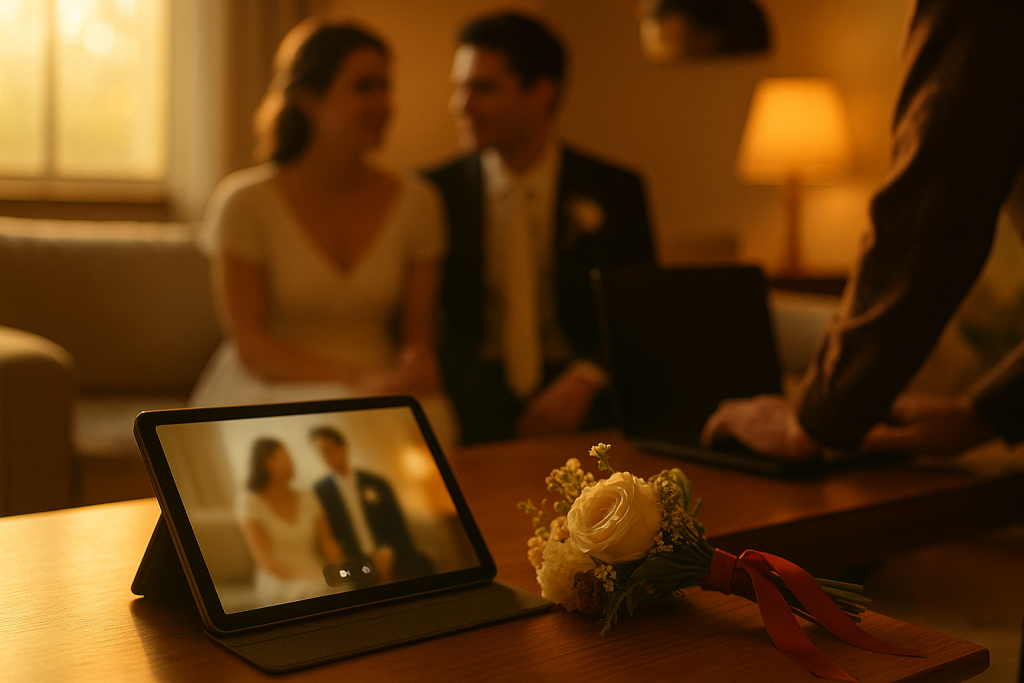Hey there! Thinking about tying the knot online and wondering if your virtual marriage will be recognized across all 50 states? You’re not alone. With the rise of online weddings, it’s essential to understand how different states view these ceremonies. Let’s dive into the details to help you navigate this modern approach to saying “I do.”
Understanding Virtual Marriage
A virtual marriage, often referred to as an online marriage or Zoom wedding, allows couples to get married online without being physically present in the same location. This method has gained popularity for its convenience, especially among international couples or those separated by distance.
States That Recognize Virtual Marriages
As of now, a few states have embraced virtual marriages:
- Utah: Utah stands out as a pioneer, permitting fully virtual marriages for both domestic and international couples. The state allows couples to obtain a marriage license and have the ceremony officiated online, making the process seamless and accessible. Learn more about Utah’s virtual marriage process.
- Colorado: Colorado allows couples to apply for marriage licenses online and permits virtual ceremonies, provided both parties are physically present in the state during the ceremony. Read about Colorado’s virtual marriage regulations.
States with Restrictions on Virtual Marriages
Many states have specific requirements that may limit or prohibit virtual marriages:
- California: Some counties offer virtual marriage license appointments and ceremonies, but both applicants must be physically present in the same room within the state during the ceremony. These provisions are subject to change, so it’s advisable to check with local county clerk offices for the most current information.
- Hawaii: The state does not permit online ceremonies. Both the couple and the officiant must be physically present at the same place and time for the marriage ceremony.
States That Do Not Recognize Virtual Marriages
Several states do not recognize virtual marriages, requiring physical presence for both the application and ceremony. For instance, Georgia mandates that all parties be physically present during the ceremony for it to be legally binding. Check out our state-by-state guide for more details.
Virtual Marriages and Immigration
If you’re considering a virtual marriage for immigration purposes, it’s crucial to understand the requirements. The U.S. Citizenship and Immigration Services (USCIS) generally accepts virtual marriages if:
- The marriage is legally recognized in the jurisdiction where it was performed.
- The couple provides a valid marriage certificate.
- The marriage has been consummated after the ceremony.
For more detailed information, visit our Immigration Support page.
How to Proceed with a Virtual Marriage
If you’re set on a virtual marriage, consider the following steps:
- Research State Laws: Determine which states allow virtual marriages and understand their specific requirements.
- Choose a State: Opt for a state like Utah that offers a straightforward virtual marriage process.
- Obtain a Marriage License: Follow the state’s procedure to apply for and receive your marriage license.
- Plan the Ceremony: Schedule your virtual ceremony with a licensed officiant in the chosen state.
- Complete Necessary Documentation: After the ceremony, ensure all paperwork is correctly filed to obtain your marriage certificate.
For a step-by-step guide, visit our How It Works page.
FAQs About Virtual Marriages
Is a virtual marriage recognized in all 50 states?
No, recognition varies by state. Some states fully recognize virtual marriages, while others have restrictions or do not recognize them at all.
Can I get married online if I live in a state that doesn’t recognize virtual marriages?
Yes, you can get married online in a state that allows virtual marriages, and your home state may recognize the marriage if it was legally performed elsewhere.
Are virtual marriages valid for immigration purposes?
Generally, yes, if the marriage is legally recognized in the jurisdiction where it was performed and meets USCIS requirements.
Do both partners need to be in the same location during a virtual marriage?
Requirements vary by state. Some states require both parties to be physically present in the same location, while others do not.
How do I obtain a marriage license for a virtual marriage?
The process depends on the state’s regulations. Typically, you’ll apply online through the state’s marriage license portal.
Embarking on a virtual marriage journey can be exciting and convenient, but it’s essential to understand the legal landscape to ensure your union is recognized. If you have more questions or need assistance, feel free to contact us. We’re here to help you navigate the process and celebrate your love, no matter where you are.




